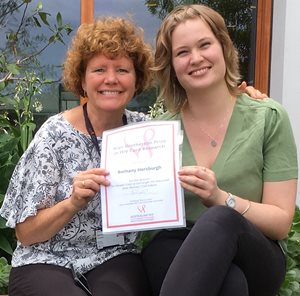October 17, 2018 Print
Bethany Horsburgh, a PhD student from the Westmead Institute and University of Sydney, won the Alan Brotherton Prize for her abstract at the 2018 Australasian HIV & AIDS Conference.
Bethany presented her work on using full-length sequencing to understand the genetic traits of latent reservoirs, which contain HIV that is capable of replicating after treatment has ceased.
 Bethany (right), with supervisor Associate Professor Sarah Palmer (left).
Bethany (right), with supervisor Associate Professor Sarah Palmer (left).
“Only a small portion of HIV is genetically intact and can replicate,” Bethany explained
“This portion usually ‘hides’ within the body to avoid being eliminated by treatment. When treatment stops, the virus hidden in latent reservoirs can replicate, and re-infect patients.
“We were looking for information about what remains in the body during long-term therapy which could help us better target the reservoir.
“By understanding certain traits, such as how the reservoir is being maintained, which cells it is in, and what the HIV itself looks like, we have a better understanding of the enemy, and therefore can develop better strategies for cure.”
The Alan Brotherton Prize is named after one of Australia’s pioneer HIV activists, who was a key advocate and figure in shaping Australia’s response to the HIV epidemic. The Prize recognises the most outstanding abstract relating to an HIV cure.
Bethany is the second-ever recipient of the award.
“For me, being awarded a prize in the name of someone who has such an incredible legacy is a huge honour,” Bethany said.
“The community are key to all we do, and to be recognised in this way is a very humbling experience.”
Congratulations, Bethany!